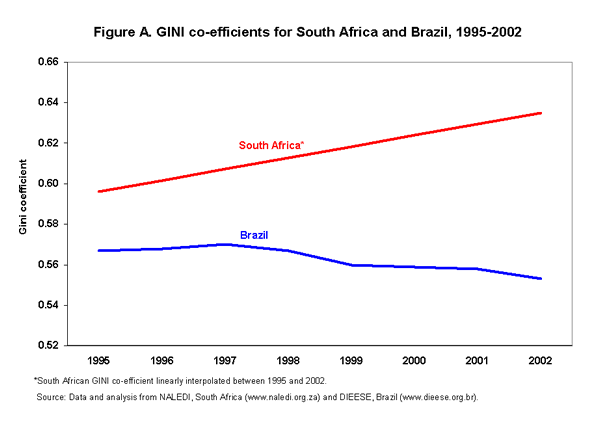See Snapshots Archive.
Snapshot for April 19, 2006.
South Africa’s economic gap grows wider while Brazil’s narrows slightly
South Africa and Brazil are among the countries in the world with the greatest degree of economic inequality. Both have people with enormous wealth who stand in sharp contrast to a large part of the population living in poverty and extreme poverty.
In the GINI co-efficient, an economic formula that expresses income inequality, South Africa and Brazil historically have “competed” for the highest index (most unequal) economy in the world. But in 1995, South Africa surpassed Brazil, which had, for decades, held the dubious title of the country with the greatest inequality. In the past 10 years, South Africa’s economy has become steadily more unequal while Brazil’s economy has become steadily more equal, although Brazil’s inequality is still high (Figure A ). While South Africa (.63) and Brazil (.55) had high GINI numbers (or more inequality) in 2002, by comparison Gemany, Sweden, and Finland all had relatively low (.25) GINIs in 2000.

The Global Policy Network (GPN) partner in Brazil, Departamento Intersindical de Estatística e Estudos Sócio-Econômicos (DIEESE), says the downtrend in Brazil’s GINI is due to the buying power of the minimum wage, which has increased steadily since 1994, hence increasing the buying power of the poor. However, DIEESE points out that while the GINI index has declined, there has been a simultaneous decline in the median income of workers, which fell from a monthly salary of $426 in 1996 to $346 in 2004. There are also questions about the calculation of the GINI because the rich often under-report interest income, rent income, and profits, resulting in an underestimation of the income of the wealthiest Brazilians.
In South Africa, the economic and social inequality that was inherent in the Aparthied regime has continued, and even increased, since majority rule was instituted in 1994. The first economic plan, the Reconstruction and Development Program (RDP) addressed inequality, but was superceded by the government’s unilateral implimentation of the neo-liberal Growth, Employment, and Redistribution Program (GEAR). The result has been a sharp increase in unemployment (42% by unofficial definition) as workers lost salaried jobs and were dumped into the informal economy. The government’s redistribution programs have focused on a few black entrepreneurs who have become millionaires and billionaires overnight, thus contributing to inequality.
Both Brazil and South Africa have a long way to go to reduce the extreme inequality in their societies, but one country seems headed in the right direction while the other is headed in the wrong one.
This week’s Snapshot was written by EPI International Policy Coordinator Tony Avirgan.
